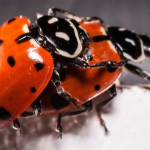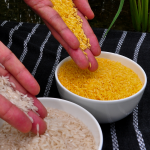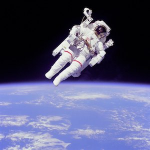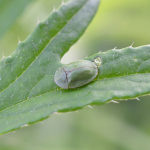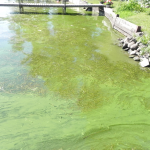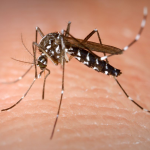Researchers have once again turned to nature for inspiration: A team of chemists working for the U.S. Air Force used crystals extracted from butterfly wings to detect trace chemical warfare agents.
Biomedicine & Biotech
A new research study on the penetration mechanics of the beetle penis – its bending stiffness gradient compounded by its soft tip – could actually hold some promise in the medical-device realm of catheter design to further the understanding in erectile dysfunction.
Golden rice lives up to its name, both for its color and the beneficial effect it can have on those (especially children) with vitamin A deficiency. Yet, the main obstacle preventing its distribution is the disinformation about genetically-engineered foods spread by anti-GMO Luddites. Let's hope that changes for the holidays.
Why are there more left-handed ping pong players than tennis players? One researcher believes he has the answer: Time pressure.
Being an astronaut is a hazardous job. Not only are they exposed to higher levels of radiation and the fury of Earth's atmosphere upon re-entry, they must also handle a nearly 2° F increase in core body temperature.
If you're ever in need of an impressive biological story, look no further than the examples of mutualism, when two totally unrelated species not only coexist, but both benefit from the relationship. Check this out.
In March of 2016, a game called "Tom Clancy's The Division" was released. Unlike other "shooter" games such as "Destiny" and "Call of Duty", "The Division" has a compelling science story.(1) And the plot began on "Black Friday", the busiest shopping day of the year.
Of the four "reclones" that were born, three are alive and well. They will be monitored (hopefully) for years to come in order to provide more data on the health of clones, and their reclones. Stay tuned for a follow-up in 2027!
Despite tens of billions of dollars being spent for research, testing and raising public awareness across the U.S. algae levels aren't dropping, they're rising. An investigation reveals that of more than 1,100 lakes and reservoirs studied by the EPA, an algae-created toxin that causes human sickness was found in over one third of them.
A review paper (1) recently found that organic crop yields are 19-25% lower than conventional systems.
However, in a recent visit to the University of Guelph, Carlo Leifert of Newcastle University noted that organic wheat yields at their Nafferton Farm were beyond the conventional wheat yields of the 1980s. He suggests that while organic yields may be lower at any given date, they also keep rising. If more science was applied to organic agriculture, scientists and famers could develop specific varieties and methods to enhance organic yields, as well as attendant ecological benefits.
Alzheimer’s Disease is so frustrating to its victims, caregivers, and scientists looking for effective treatments. In what at first glance is a "Dracula moment," Alkahest – a Silicon Valley start-up – weighs in on the effects of infusing the plasma of younger, healthier individuals into patients with Alzheimer's.
Science struggles in a regulatory environment that increasingly puts the precautionary principle over benefit, and regulators that cater to environmental groups that view science as some corporate conspiracy.

